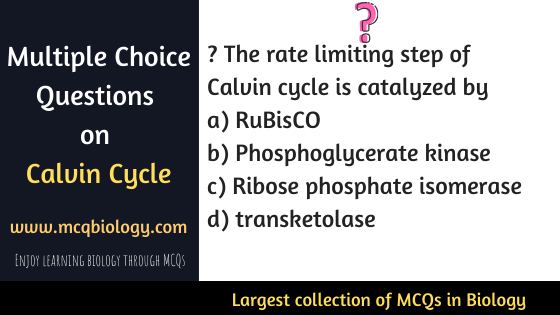1. Which of
the following is the correct statement regarding Calvin Cycle?
a) it cannot occur
during day time
b) it is light
dependent
c) it is light
independent
d) it occurs rapidly
at night
2. The rate limiting
step of Calvin cycle is catalyzed by
a) RuBisCO
b) Phosphoglycerate kinase
c) Ribose phosphate isomerase
d) transketolase
3. How many
phosphoglyceraldehyde is required to form a glucose molecule?
a) 1
b) 2
c) 3
d) 4
4. Which of
the following is involved in the activation of RuBisCO?
a) K+
b) Zn2+
c) Mg2+
d) Ca2+
5. How many
ATP is required for the synthesis of 1 molecule of glucose?
a) 6
b) 12
c) 18
d) 24
6. How many NADPH
is required for the synthesis of 1 molecule of glucose?
a) 6
b) 12
c) 18
d) 24
7. All the
following enzymes are involved in regeneration of RuBP except
a) Phosphoglycerate kinase
b) Transketolase
c) Ribose phosphate isomerase
d) Phosphoribulokinase
8. How many
ATP is required for the regeneration of RuBP in Calvin cycle?
a) 6
b) 12
c) 18
d) 24
9. The first
stable compound formed in Calvin Cycle is
a) Glyceraldehyde 3 phosphate
b) 1,3 bi phosphoglycerate
c) 3-phosphoglyceric acid
d) Ribulose bi phosphate
10. Calvin
cycle is also called as
a) Reductive pentose phosphate cycle
b) CBB cycle
c) Dark reaction
d) All of these
11. The 𝐶3 cycle has been often called an evolutionary flaw. What may be Plant Physiology basics the reason for saying so?
I. The rubisco enzyme that carries out
𝐶3 cycle is equal affinity to Oxygen
II. The flaws in the 𝐶3 cycle leads to Photorespiration which is less
energy efficient
III. The statement is incorrect, 𝐶3 cycle has no flaw
Choose the correct statements
a) I
b) II
c) I and II
d) III
Answers
1. c) it is light
independent
2. a) RuBisCO
3. b) 2
4. c) Mg2+
5. c) 18
6. b) 12
7. a) Phosphoglycerate kinase
8. a) 6
9. c) 3-phosphoglyceric acid
10. d) All of these
11.c) I and II
